Choosing what is the best formula for newborns is probably one of the most important decisions you have to make. The quality of nutrition that people receive as an infant can determine their health, physical skills, and mental prowess for years to come, and this is all heavily dependent on the kind of infant formula you would choose for your child. Your baby’s nutritional needs across ages stages have to be met for optimal growth.

The best available food for infants is still breastmilk, as it contains many nutrients and good bacteria which are yet to be replicated perfectly by baby formulas. Ideally, mothers will not have any problems with breastfeeding until their child’s first birthday since the American Academy of Pediatrics highly recommends it. The Centers for Disease Control and Prevention (CDC) recommends breastfeeding babies for up to a year. However, it may be hard to obtain breastmilk for your baby, whether due to the mother not producing enough of it or not having the time to pump breastmilk. For these scenarios, baby formulas can be very beneficial, and formula feeding can help mothers unwind from the demands of breastfeeding. Talking to your pediatrician would help you get started.
Most commercially available baby formulas usually present themselves as the best for babies, both local and imported formulas. The only difference is that the Food and Drug Administration (FDA) has not issued any approval to formula brands from Europe and from other countries, for that matter. This is because this approval from the FDA also involves inspection of manufacturing facilities, something that is not feasible. The American Academy of Pediatricians says that dairy is the best source of calcium for children. However, common sense dictates that not every formula will give the results you want. What is the best newborn formula you may ask? Or for different ages stages? That answer will depend on your baby as much as the formula itself. This article will discuss several major types of formula used for babies, as well as the pros and cons of using each.
Cow’s Milk
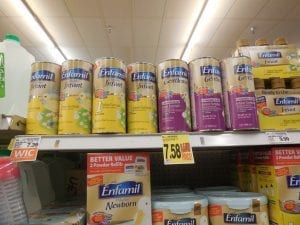
Cow’s milk is the most popular choice of mothers when it comes to formula feeding across ages stages of your baby’s growth. This baby formula uses cow’s milk as the base, with several other ingredients added to create a solution that more closely resembles breastmilk.
If you’re looking for the best formula for baby, this type of formula might be a good choice as it is readily available, one of the cheapest, and recommended by experts. It’s an excellent option for newborn babies who don’t have any special food requirements. However, pay attention to how you need to prepare the formula, as some varieties might have higher amounts of casein than whey. These two proteins naturally occur in milk, but newborns will have a harder time digesting the former than the latter. Make sure that the formula is based on whey so that your child does not encounter any digestive problems.
Also, check first if your baby is lactose-intolerant or is otherwise allergic to cow’s milk. Both are contraindications for using cow’s milk formula. As such, babies will have an anaphylactic shock when fed with any dairy product. It is a severe allergic reaction that requires hospital intervention and can be lethal. To be on the safe side, consult a doctor first to determine any allergies present.
Goat’s Milk Formula
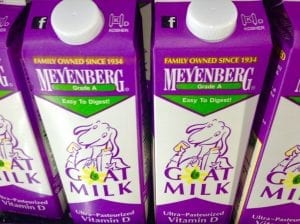
Some would say this formula is sometimes the safer alternative to a cow’s milk-derived formula for babies allergic to dairy products. Unfortunately, this is not true, as the proteins found in goat’s milk are similar enough to proteins in cow’s milk that they will still elicit an allergic reaction from both. It also isn’t true that goat’s milk has a superior nutritional profile than cow’s milk; goat’s milk may have fewer nutrients than cow’s milk. Hence, this may not be the best formula for newborn babies and the right formula for your baby unless your child has a particular taste preference for goat’s milk.
Soy-Based Formula
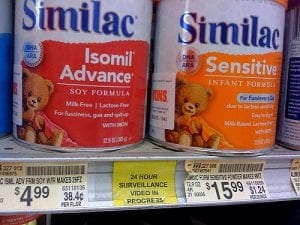
This formula came from plant sources. So, this might be the best formula for newborn babies who are on a vegan diet or those whose families follow certain cultural or religious practices that ban the use of animal products.
However, it is crucial to get the approval of a doctor first. This formula is usually only recommended for babies aged six months and up. In addition, many babies who are allergic to cow’s milk will also be allergic to soy-derived formulas. Hence, this is still not a viable alternative for babies with allergies.
Soy-based formulas also have significant levels of naturally occurring phytoestrogens that can damage the reproductive system, although the evidence is still mixed. Finally, soy-based formulas are typically sweet due to the glucose syrup. This kind of infant formula lacks lactose, and the glucose can cause accelerated tooth decay if oral hygiene is insufficient.
Hypoallergenic Formula For Newborn
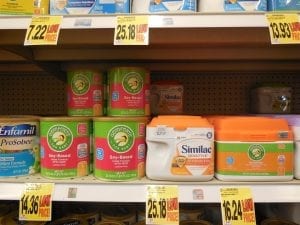
For babies that are allergic to dairy products, a hypoallergenic formula may be the best formula for newborn babies like them. Milk proteins in hypoallergenic formulas have undergone hydrolysis, which breaks them down into smaller molecules. Many hypoallergenic formulas are also lactose-free. Because of these, sensitive newborns can safely consume these formulas without risk of any allergic reactions occurring.
Be warned though that some infant formulas are only partially hydrolyzed. These formulas claim to make digestion easier. They break down some of the proteins found in the milk, but no scientific evidence supports this claim so far. Also, they still contain enough whole milk proteins to cause a dangerous allergic reaction. Make sure to buy only fully hydrolyzed, hypoallergenic formulas if you have a baby who is sensitive to dairy products.
So What Is The Best Newborn Formula?
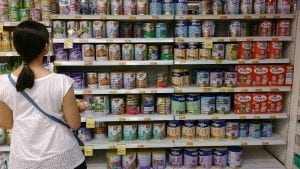
Again, this will depend on the particular needs of your newborn baby. Their needs and preferences will largely dictate the formulas that are suitable for them. Whatever infant formula you choose, make sure to consult a doctor first to be able to minimize any risks as your child would grow to consume solid foods when your baby gets older. Finally, consider feeding your baby breastmilk for the first few weeks as much as possible, as breastmilk will always be superior to baby formulas at any time. Breastfeeding can also help in times of a formula shortage or crisis.
Frequently Asked Questions (FAQs)
What is the closest infant formula to breast milk?
Enfamil Enspire baby formula is the closest formula to breast milk that you can find in the market today. The infant formula brand has managed to synthesize two ingredients—Lactoferrin and MFGM—that breast milk has.
Which baby formula is best for newborns?
Enfamil A+ is the baby formula that a lot of hospitals recommend to moms who cannot breastfeed. Aside from vitamins, minerals, DHA, and choline that boost eye and cognitive development, it also has polydextrose and fiber so that newborns can digest formula milk easily. Be sure that your baby’s formula is iron-fortified. You can also check the top formulas for infants for the current year here: https://www.experiencedmommy.com/best-baby-formulas/.
Is Enfamil better than Similac?
Similac is not a wrong source of baby formula, but it cannot compare to Enfamil in terms of benefits. The main difference between these two infant formulas is that the former may cause allergies and has more added sugar, while the latter does not have such issues.
What is the best formula for a gassy baby?
Your child’s doctor may have most likely recommended Enfamil Premium Gentlease as it is said to be the best infant formula for gassy babies. Studies showed that infants who had this milk became less colicky than usual after some time.
How do you know if Formula doesn’t agree with your baby?
You will know if the infant formula is not good for your baby if they develop allergies because of it. It should not make them gassy either.
Can babies have 2 different infant formulas?
Yes, of course. It is not the most common practice, but you can even mix two different formulas.
What is the healthiest baby formula?
The best organic formula may be Similac Pro-Advance Non-GMO Infant Formula. One of its components is 2’ FL human milk oligosaccharide, which is found in breast milk. This infant formula does not have synthetic ingredients that promote your baby’s growth either.
Is it OK to switch baby formula back and forth?
Yes, you can alternate the baby formulas that you prepare for your child. It should not harm them as long as both infant formulas don’t have components that your baby is not supposed to have as long as this follows safety standards.
What ingredients should I avoid in baby formula?
You don’t want corn maltodextrin in your baby’s milk since that’s what’s found in corn chips, and maltodextrin is another form of added sugar. Watch out for infant formula products with nanoparticles and aluminum as well. This is crucial for disease control.
Is Similac or Nan Pro better?
The answer to this question highly depends on your child’s needs and price range. Similac is more readily accessible in most stores, while Nan Pro formulas have added nutrients that Similac does not have such as taurine, nucleotides, ARA, and L-carnitine.
Does Nan milk increase body weight?
While weight gain highly depends on your child’s growth pattern, parents have reported that Nan formulas help babies increase weight.
Should I wake my newborn to feed?
Before doing so, do familiarize yourself with your baby’s sleeping pattern. Typically, newborns would have to be awakened up as they need to be fed every 3 to 4 hours. Older babies do not need to be awakened for their daily dose of baby formula. Babies younger than 6 months can still be awakened for their feeding time.
What is the closest formula to breast milk?
Whole cow’s milk is the closest formula to breast milk. However, a lot of organic formulas have just as much potential as cow’s milk when it comes to mimicking breast milk. There are a lot of options to choose from Similac, Enfamil, Nan Pro, Earth’s Best Organic, etc.
How much formula should a 1-week-old have?
We recommend talking to your child’s doctor or a trusted health professional in terms of the specific amount that your newborn needs. Generally speaking, however, 1-week-old formula-fed babies are recommended to be given 2 to 3 ounces of baby formula to be fed every 2 to 3 hours.
Can I breastfeed during the day and formula at night?
There is no problem for mothers to consider breastfeeding during the day and giving formula at night. This allows formula-fed babies to still get the essential nutrients from breastmilk while still relieving their mothers of the obligation to breastfeed on a frequent basis.
What happens if I give my newborn water instead of baby formula?
While water is healthy for adults, it should not be given to formula-fed babies, particularly newborns below 6 months of age. Besides the fact that water does not contain the essential nutrients necessary for your baby’s development, giving water may pave way for your baby to develop hyponatremia, a life-threatening complication that causes brain swelling.
Is formula more filling than breastmilk?
Milk formula is digested slower than breastmilk, making your newborn feel full for extended periods of time. With this, it can be said that formula is more filling than breastmilk.
What is the normal amount of formula for a newborn?
Generally speaking, newborns are given the normal serving amount of 2 to 3 ounces of baby formula, and they are to be fed every 2 to 3 hours. Refrain from giving more servings of baby formula to avoid gassiness among babies and also to minimize the risks of developing serious health problems.
How do you know my newborn is full from feeding baby formula?
One helpful clue is when your baby pushes their baby bottle away from them after drinking baby formula. Rejecting their baby bottle when served is another clue that your baby is still full from his or her previous feeding session.
Best Formula For Newborn Babies
Other Resources:
ScaryMommy – https://www.scarymommy.com/spotted/best-baby-formulas/
Pampers – https://www.pampers.com/en-us/best-baby-products/feeding/best-baby-formula
Last Updated on January 13, 2023 by Bry Roquero
DISCLAIMER (IMPORTANT): This information (including all text, images, audio, or other formats on FamilyHype.com) is not intended to be a substitute for informed professional advice, diagnosis, endorsement or treatment. You should not take any action or avoid taking action without consulting a qualified professional. Always seek the advice of your physician or other qualified health provider with any questions about medical conditions. Do not disregard professional medical advice or delay seeking advice or treatment because of something you have read here a FamilyHype.com.
Thanks for sharing.I really appreciate it that you shared with us such informative post, great tips and very easy to understand.